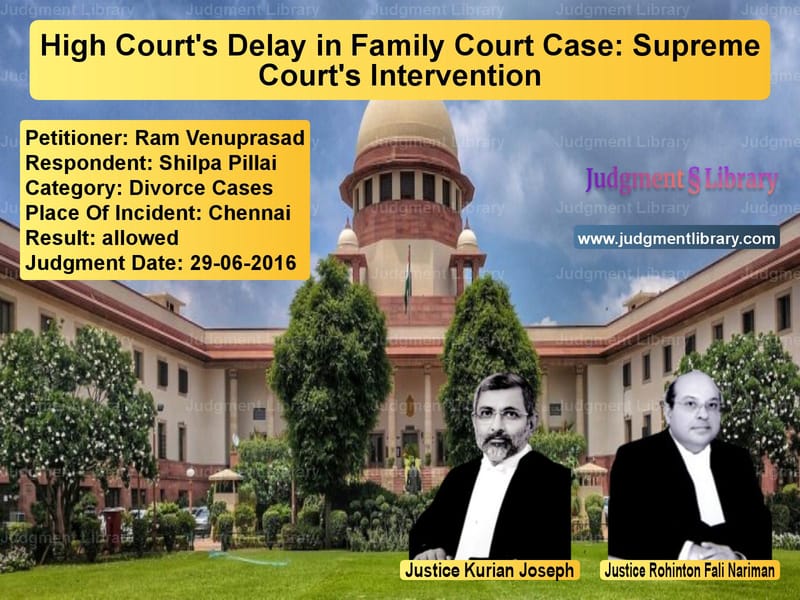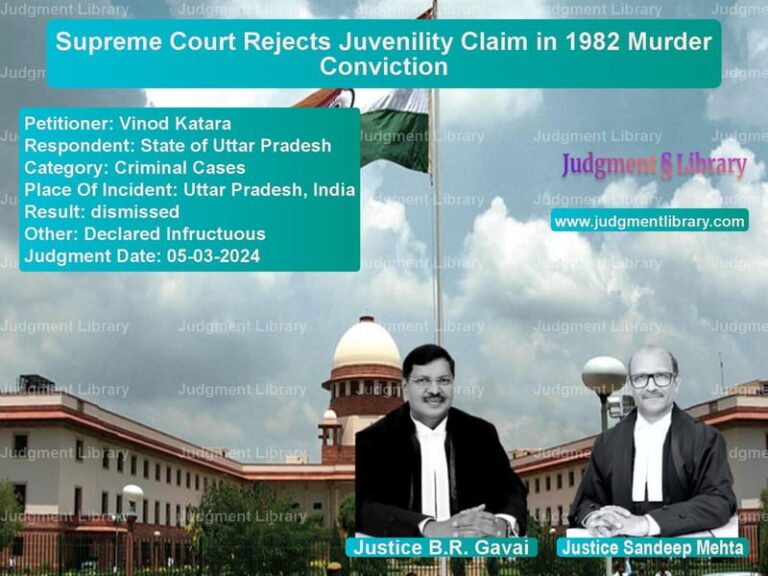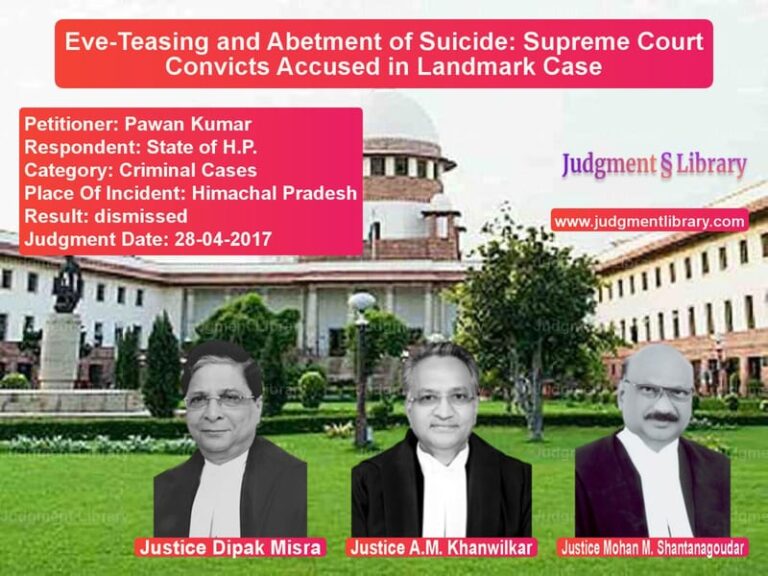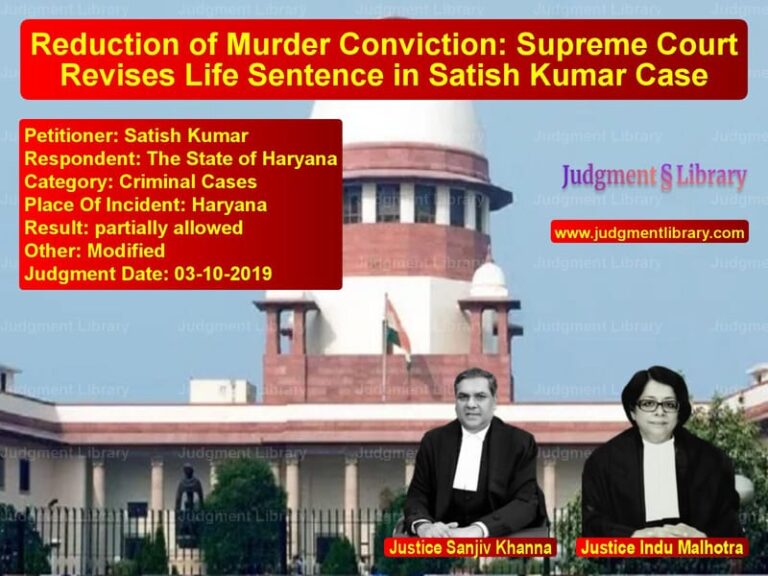High Court’s Delay in Family Court Case: Supreme Court’s Intervention
The case of Ram Venuprasad v. Shilpa Pillai was brought before the Supreme Court due to the delay in the disposal of a matrimonial case despite a clear directive from the High Court of Madras. The judgment delivered on June 29, 2016, by Justices Kurian Joseph and Rohinton Fali Nariman underscores the importance of timely judicial proceedings, particularly in sensitive family matters.
The appellant, Ram Venuprasad, approached the Supreme Court as the Third Additional Family Court in Chennai failed to act upon the direction given by the High Court of Madras to resolve his pending case within three months. Despite the directive dated June 29, 2015, the case remained unresolved for nearly a year, prompting Supreme Court intervention.
Background of the Case
The dispute arose from a family court proceeding (H.M.O.P. No. 1606 of 2014) pending before the Third Additional Family Court, Chennai. The High Court of Madras had instructed the family court to conclude the matter within three months, but the case remained unresolved even after an extended period.
Frustrated with the inaction, the appellant sought relief from the Supreme Court, leading to a directive requiring an explanation from the family court regarding the delay.
Supreme Court’s Initial Order
When the matter was presented before the Supreme Court, it passed an order stating:
“It is seen from the impugned Judgment that the High Court had directed the Third Additional Family Court, Chennai, to dispose of H.M.O.P. No. 1606 of 2014 within a period of three months from the date of the impugned Judgment. The impugned Judgment was delivered on 29.06.2015.”
Observing that the case was still pending after nearly a year, the Court directed the Registry to obtain a report from the Third Additional Family Court, Chennai, explaining the reason for the delay. The Court also ordered that the report be submitted within four weeks.
Response from the Family Court
In response to the Supreme Court’s directive, the Third Additional Family Court, Chennai, submitted a report dated May 30, 2016, explaining the cause of the delay. The report stated:
“Only because of the non-cooperation on the part of the respondent/wife, the disposal of the case was delayed.”
Furthermore, the Family Court assured the Supreme Court that the case would be taken up on a day-to-day basis and disposed of expeditiously. It was also reported that the matter had been scheduled for July 12, 2016.
Final Supreme Court Order
Taking the report into account, the Supreme Court issued the following directive:
“We direct the Third Additional Family Court, Chennai to conduct the trial on a day-to-day basis and dispose of H.M.O.P. No. 1606 of 2014 on or before 31.08.2016. The appellant is directed to produce the copy of the judgment before the Family Court.”
With this direction, the appeal was disposed of without any order as to costs.
Key Takeaways from the Judgment
- The Supreme Court reaffirmed that family disputes should be resolved promptly to prevent unnecessary hardship for the parties involved.
- The Court took a proactive approach by seeking an explanation from the family court rather than allowing undue delays to persist.
- The judgment highlights the judiciary’s accountability, ensuring that lower courts adhere to timelines set by higher judicial authorities.
- By directing a day-to-day hearing, the Supreme Court ensured that the case would be resolved without further delays.
Impact of the Ruling
The intervention by the Supreme Court serves as a strong reminder of the need for adherence to judicial directives. The decision reinforced that:
- Judicial orders must be followed within stipulated timeframes.
- Delays in family court matters can have adverse effects on the lives of those involved.
- Courts must ensure that cases are resolved promptly, especially when delays are caused due to non-cooperation by one party.
Ultimately, the Supreme Court’s ruling provided a much-needed push for the timely resolution of the pending matrimonial dispute, setting a precedent for similar cases in the future.
Don’t miss out on the full details! Download the complete judgment in PDF format below and gain valuable insights instantly!
Download Judgment: Ram Venuprasad vs Shilpa Pillai Supreme Court of India Judgment Dated 29-06-2016-1741872506593.pdf
Direct Downlaod Judgment: Direct downlaod this Judgment
See all petitions in Alimony and Maintenance
See all petitions in Judgment by Kurian Joseph
See all petitions in Judgment by Rohinton Fali Nariman
See all petitions in allowed
See all petitions in supreme court of India judgments June 2016
See all petitions in 2016 judgments
See all posts in Divorce Cases Category
See all allowed petitions in Divorce Cases Category
See all Dismissed petitions in Divorce Cases Category
See all partially allowed petitions in Divorce Cases Category







